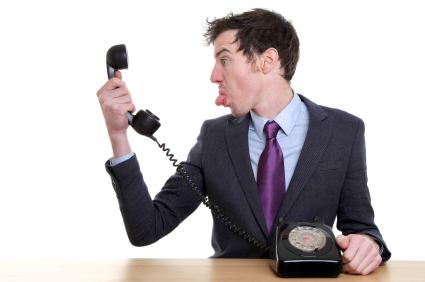Working as a receptionist comes with the territory of answering a lot of questions. People generally call a business for answers and receptionists should have them prepared for callers. Sometimes a newer receptionist has less familiarity with the proper responses to typical questions. In this case, it’s always great to have a phone script on hand. If you want your latest hire to become a good receptionist, we suggest you outline the proper telephone etiquette for receptionists.

Don't have time to read now?
Download a PDF copy to read later.
This article is over 1800 words, packed full of actionable tips to asking and answering questions. Download a copy to read later, and you can come back to it over and over again.
Better yet, share it with a friend or co-worker.
Customer Service Snafus
First, let’s talk worst-case scenario. Say you don’t teach those who are responsible for answering the phones proper telephone etiquette for receptionists. What’s the worst that could happen?
When some secret shoppers called veterinary clinics, they found out the answer to just that. Some of the answers were less than tactful. And that’s being generous. Like when one was asked why pre-anesthetic treatment was necessary, she said “To make sure your pet’s liver and kidneys could process the anesthesia, and so we don’t have any problems with her crashing on the operation table.” Not a good mental picture for someone who is already concerned about the safety of their pet.
There isn’t a phone script for everything.
You can’t prepare a planned out phone script for every single question that your receptionist is likely to receive. But what you can do is teach them to pause before they speak. You can teach them to consider how their tone or their words could affect the person on the other line. You can talk about empathy, and more importantly, teach tact.
What is Tact?
Tact is about being open and honest without hurting anyone’s feelings along the way. It’s about being gentle in all situations. It’s being considerate of other people’s feelings when giving difficult feedback and communicating sensitive information.
Tact encompasses many things, including emotional intelligence, respect, discretion, self-awareness, thoughtfulness, compassion, subtlety, honesty, diplomacy, and courtesy. It helps you avoid conflict and find common ground. It’s all around good manners.
How do you teach tact?
Tact is something learned over time, with a lot of practice. If your receptionist is boastful about his “brutal honesty” it might be harder for him to get tact down. Here are a few pointers for tactful telephone etiquette for receptionists:
- Slow down. Being tactful is not about saying what immediately comes to mind. It’s better to take a pause and say things in a more sensitive manner.
- Think of the timing. If your caller is upset with services provided, you shouldn’t mention their remaining balance before helping them.
- Choose words carefully. Generally starting a phrase with “You” in confrontations seems accusatory. It’s better to start with “I” statements. In general, keep what you say brief.
- Watch your body language and tone. Body language isn’t as important over the phone, but sometimes the way in which we are holding our bodies create a rude tone over the phone. Be aware of this, have good posture, and don’t cross your arms or legs when speaking.
- Never react emotionally. Learn to set your emotions aside at work.
Now that you know what to do about unscripted situations, we’ll give you some go-to things to say for different situations. Starting with not knowing the answer to a caller’s question.
“I don’t know” is a No-No
No one likes a know-it-all, and it’s more than alright to mention if you don’t know something on an average day. However, when speaking to a caller, general telephone etiquette for receptionists is to not simply tell the other person that you don’t have the answer. They’re expecting you to have all of the answers and you shouldn’t let them down. There are several different things you may want to say in place of ‘I don’t know,’ depending on the specific situation. And, guess what? You can still answer with confidence without having the answer.
As answering service professionals a line we heard recently that made us wince was “Oh, you’re gonna have to talk to a doctor about that. I’m just a receptionist.”
Project authority!
You don’t have to know everything in order to sound confident and professional. You know how I said that you don’t have to know the answer to convey confidence? It’s all about having confidence in your voice and using polished language, like some of the examples below.
Just as it is with customer service, it’s important to have a receptionist who can give information with conviction. Not the kind of person that thinks of themselves as “just a receptionist.” Receptionists are important!
If you need a moment before answering a basic question
You don’t always have the answer right away. Even if it’s a simple question that you think you have the right answer for, you want to be sure before giving that away to a caller. It’s okay to double check with someone else about the answer. Just ask the caller if you may put them on hold first, wait for their answer, place them on hold and ask someone for reassurance. Even if that someone is Google.
Telephone etiquette for receptionists approved responses:
- You know, that’s a good question. Let me find out an answer for you. Do you mind if I place you on hold?
- I’ll be happy to answer that for you. Would you mind if I placed you on hold for a moment?
If you’re unsure of the answer, but you know someone who can answer with confidence
Don’t hesitate to transfer the caller over to the correct person for their question. Generally people are only wary to be connected with someone else if they’re put on hold for too long. Our solution to this is to be sure that the call is picked up quickly by whom it’s transferred to. If it isn’t, pick the line up again and ask for their name and number so that the correct person can call them back.
Telephone etiquette for receptionists approved responses:
- That’s a great question. I know that Margot will have the answer you’re looking for. I’ll put you in touch with her.
- Joseph would be the best person to help you. He’ll be happy to return your call. May I have your telephone number?
If you don’t know the answer and you don’t know who could answer it
You don’t always have a resource on hand for helping you get out of a sticky situation. But you can ask around.
- Great question! Let me find the best person to answer it.
- Great question! I’ll find the best person to answer it, and have that person return your call. May I have your telephone number?
If the caller is pressing you for an answer that you don’t have
Sometimes callers are persistent to the point of being rude. It’s not that they’re unfriendly, it’s just that they’ve called you seeking an answer or a solution, so when you can’t give them either they feel frustrated and lost. It’s important in those times to give them alternative resources.
- This isn’t my expertise, and I would hate to give you any misinformation. Jill, our lawyer, would be very helpful in these manners and she’d be happy to speak with you regarding this matter. May I have your phone number so that Jill can answer your call?
- Dr. Johnson will be happy to help you — I would hate to give you any misinformation. Let me try to reach her for you.
Is [specific person]available?/Are they in?/May I speak to [specific person]?
It’s not really a matter of whether or not a person is in the building or on call that determines if they would like to be on the phone with a specific caller. But the caller doesn’t need to know that. Instead of telling the caller yes or no, it’s better to tell them:
- Let me try his line for you.
Get in touch with that person (or not) and determine if they have availability to speak to the caller. If not, offer to take a message.
When will she be back in the office?/When can I meet with him?
If the person they’re looking to speak to isn’t around to tell you whether they’d like to speak with or meet with this person, it’s not necessarily a good idea to look for a slot on his schedule. Instead, let the caller know that the individual keeps their own schedule.
- She keeps her own schedule, but she’ll be happy to return your call and set up an appointment. May I have your telephone number? When would be a good time to call you back?
Questions to Ask
When Transferring a Call
Never forget to ask the caller if they would mind being placed on hold. Then, wait for their answer. It’s very rude to place someone on hold without their permission.
After you’ve finished helping the caller
- Is there anything else I can help you with?
Just because you’ve solved one issue, doesn’t mean that they’re done speaking to you. Don’t let them let you off the line before they have finished getting all of their needs met. It happens often that the caller is so pleased with one solution that they forget that they had another question that they would like answered. That’s why it is important to always ask this question before wrapping up the call.
Get your FAQs right
Receiving the same questions frequently can get pretty tiring. You may begin to feel like a pull string toy, repeating the same phrases day in and day out. That’s a part of being a receptionist. Thankfully, our virtual receptionists work with a variety of clients in many different industries, and they’re able to answer many different styles of questions. But if your small business employs only one good receptionist, it would be a good idea to to make sure that the frequently asked questions, or FAQ, page on your website is fully updated to represent those questions asked. You’ll also want your website to be easily navigable so that someone visiting your site will see the FAQ page.
Will people never call again about what is answered on your FAQ? Not likely. But you probably won’t ever hear from those who prefer to do thorough web research before picking up the phone. So that’s a win.
Have your receptionist keep a running list of those often-answered questions so that you can keep your website updated.
Apply this to your small business
It’s important in all professional situations to seem polished, and you can easily do so with the right tone, with tact, and the right wording. Regardless of who answers your business calls, the above advice will set a friendly and professional tone.
Now, try this…
Once your receptionists have read this post and have a good hold of their telephone etiquette, make sure they, and the rest of your staff, check out our post on email etiquette and business texting etiquette. Your staff should be familiar with the do’s and don’ts of all forms of communication so that they can best represent your company well.









